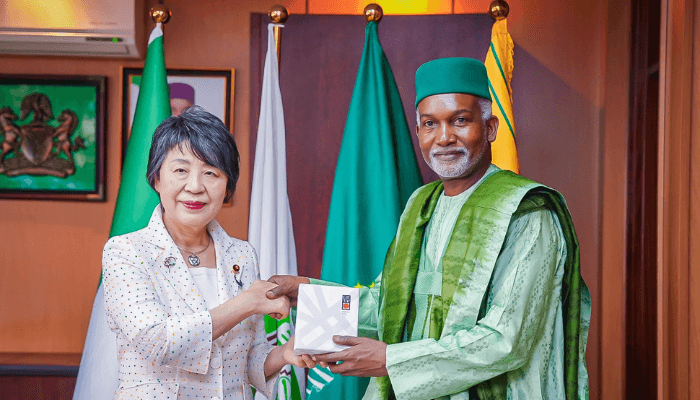Japan, through the Tokyo International Conference on African Development (TICAD) initiative, has indicated interest in upping its investment in the African tech ecosystem, particularly in Nigeria.
This was disclosed when Yoko Kamikawa, Minister for Foreign Affairs of Japan, met with Yusuf Tuggar, Minister of Foreign Affairs of the Federal Republic of Nigeria, at the TICAD ministerial meeting. The Japanese minister discussed ways to strengthen business and economic relations between both countries, focusing on startups.
TICAD is an international conference focused on Africa’s development. According to data from Africa; The Big Deal, Nigeria, home to over 200 million people, has a vibrant tech ecosystem that has attracted over $4.4 billion in investment in the last five years. According to reports, the ecosystem’s growth is down to the country’s tech-savvy population and market potential.
However, funding for the ecosystem has been declining. In the first quarter of 2024, funding fell by more than 45 percent to $466 million, marking a 9 percent quarter-on-quarter decline and a 47 percent year-on-year decline.
Japan’s interest in Africa is not nascent. In 2022, Japan invested $726 million in Africa through Japanese VC firms such as Verod Kepple. Japanese involvement in Nigeria’s tech ecosystem has primarily been through corporate venture capital (CVC), as its investment strategy in Nigeria focuses on providing patient capital.
According to the United Nations, Japan has a population of 123 million and is home to over 10,000 startups. Investments in startups in Japan have grown 10-fold in the last decade, reaching 850 billion yen ($6 billion) in 2023, according to the Japan Startup Ecosystem Report 2023. The Asian country also boasts about 9 unicorn startups, ranking 19th on the global list of countries with unicorns per a Tracxn report.
Experts believe that Japan’s move to invest in Nigeria will solidify its global presence and help local startups. However, they noted that this funding might not significantly help the ecosystem. Adedeji Olowe, the founder of Lendsqr, said, “Founders will benefit from Japanese investment. Even without funding, founders thrive. So how much more with funding?”
He further stated that Japan could connect founders with foreign expertise in addition to funding. “If these investors are serious, they could go beyond money and connect founders with expertise from Japan, as this will help greatly,” he highlighted.
Read also: Stable naira to attract fresh dollars into tech ecosystem — US Consul General
However, Olowe expressed skepticism about the investments, saying there may be a disconnect since Nigerian startups are largely Software-as-a-service-focused while Japan is a largely hardware-driven country.
“Nigerian founders are mostly software SaaS based founders, while Japan is mostly hardware country, so I think there may be a challenge. And even when you talk of hardware they do, they do the premium end of the chain, not the mass market hardware you get from China,” he added.
David Adeleke, founder of Zeeh Africa, noted that the Japanese will benefit from the lessons of Western investments.
“The Japanese are entering the system now with greater caution. They are not falling into the same traps that the West fell into again. This time, they are approaching investments with proper due diligence, carefully assessing startups before they invest,” he said.
“Whether they find it more attractive and choose to fill the void or large space that Western investors previously occupied is something that time will reveal. But one thing is certain: they are coming, and this time, they are being cautious, ensuring they conduct thorough due diligence before investing in any startup.”
Davidson Oturu, managing partner and Venture Capitalist at Nubia Capital noted that while Japan’s interest may not reverse the funding winter, it would expand the pool of funding available.
“I don’t think Japan’s interest will completely reverse the funding winter on the continent, but it introduces a new funding entity to the market, which could see more capital come in and could even also attract other investors. Also, having Japan in the mix diversifies the sources of capital for Nigerian startups. This would reduce reliance on regular sources of funding,” he said.
Adeleke of Zeeh Africa further explained that since these investments are coming, the government must ensure that foreign investments do not undermine the value of local assets or jeopardise citizens’ interests.
He added, “The government must prioritise and protect the people’s interests. We don’t want a situation where a foreign investor arrives and, because they bring money, we end up losing our value, almost as if we’re selling our birthrights simply because we’re enticed by the money they offer.
“In Rwanda, for example, there are adequate policies in place that first protect the interests of the citizens, whether they are business owners or end users. These policies are transparent, ensuring that you are fully informed as an external investor bringing in funds. They have created a fair playing field where you, as an investor, can bring your money, make good returns, and still avoid jeopardising the founders’ interests or disrupting the existing structure.”

